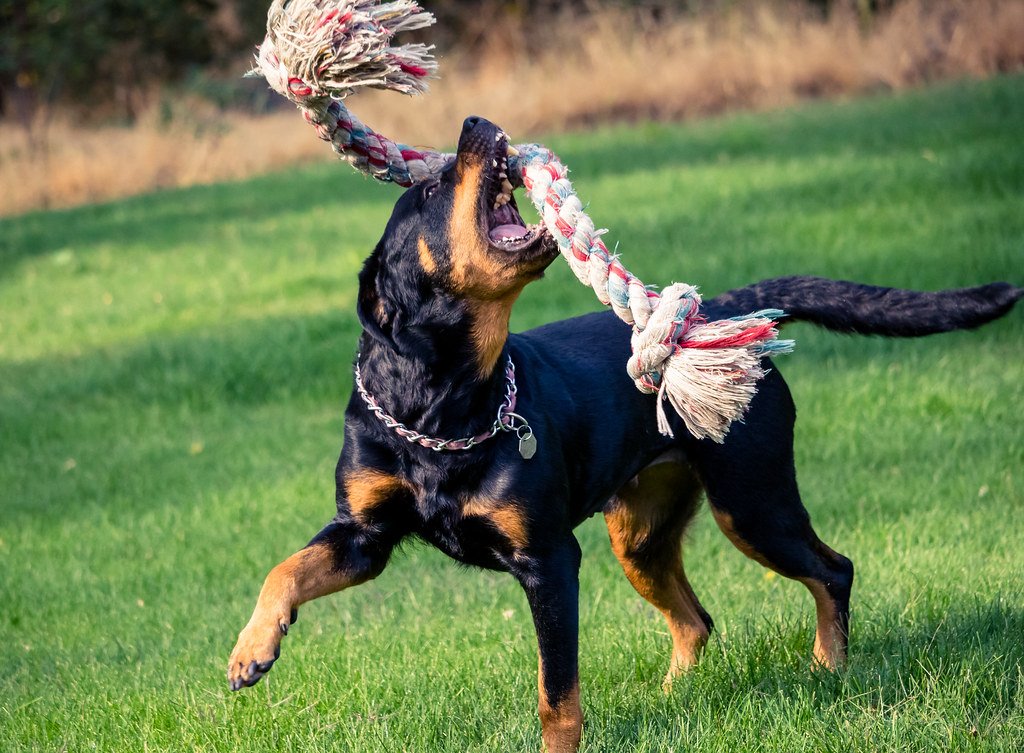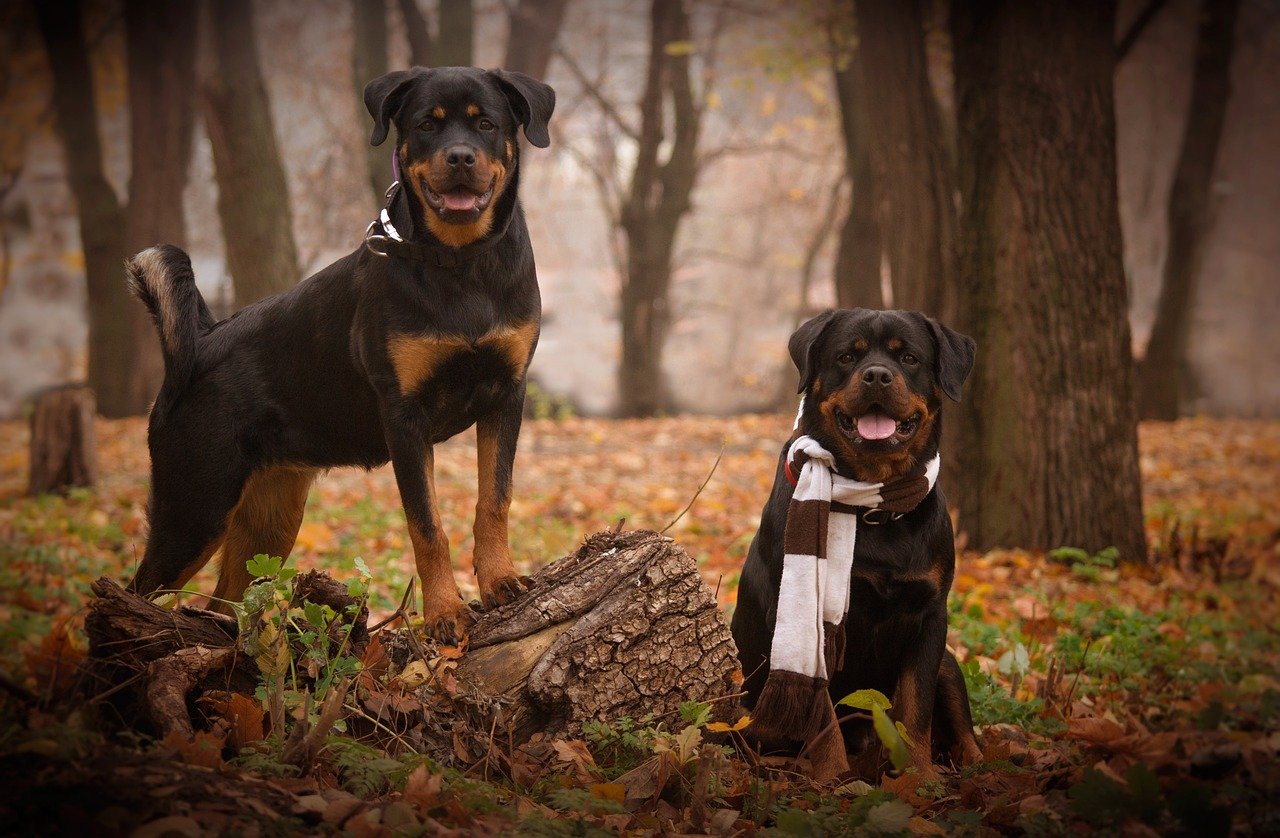There’s something undeniably captivating about the sight of a Rottweiler. These magnificent canines stroll through our neighborhoods with an unmistakable presence that commands both respect and curiosity. Yet beneath their powerful exterior lies a complexity that many people fail to understand. The truth about Rottweilers might surprise you – they’re not at all what their reputation suggests. Whether you’re considering adding one to your family or simply want to understand these remarkable dogs better, there are essential facts every pet owner should know.
The Rottweiler’s True Temperament is Nothing Like Their Reputation

While they have a reputation as being dangerous, a well-bred Rottweiler is calm, confident, and courageous, and thrives on human company. Beneath their powerful appearance though lies a gentle soul and a heart full of devotion, making Rottweilers (or Rotties) incredible companions – but only for the right person. This massive disconnect between perception and reality is one of the most shocking facts about these dogs.
In fact, Rottweilers are incredibly loving dogs and can, at times, be quite sensitive and needy. Although Rottweilers appear intimidating, they are usually love bugs. They’re very loyal and want to spend a lot of time cuddling and playing with their human families. Think of them as the gentle giants of the dog world – imposing on the outside but complete softies when it comes to their beloved family members.
They’re Extraordinarily Intelligent Working Dogs Who Need Mental Stimulation

Rottweilers are intelligent, loyal, and confident working dogs. While they are eager to please and quick to learn, their strong will and natural guarding instincts require firm, consistent training. This intelligence isn’t just for show – it’s a double-edged sword that can work for or against you as an owner.
A Rottie, as the breed is often called, is also an intelligent dog and can easily become bored. They must receive enough mental stimulation to stay engaged and prevent unwanted behaviors (like chewing your furniture). With time and patience, you may be able to train your Rottweiler to do things like bringing you your slippers or even turning the lights on and off. Your Rottweiler’s working dog nature makes learning these tricks fun and stimulating.
Exercise Requirements Are Surprisingly Moderate but Absolutely Critical

Rottweilers are loyal and slow-maturing dogs (typically reaching maturity at 12–18 months of age) that need at least 60 minutes of exercise every day. They typically need about one to two hours of exercise daily, which can be divided into multiple sessions. This exercise should include a mix of activities to meet their physical and mental stimulation needs.
Here’s what might surprise you: unlike some high-energy breeds that seem to have unlimited reserves, Rottweilers are more like marathon runners than sprinters. Rottweilers have moderate energy levels and require regular exercise to maintain their physical and mental well-being. The goal is to provide your Rottweiler with at least 1-hour of continuous exercise coupled with smaller amounts of playtime or activity in a yard every day. They need structured, purposeful activity rather than frantic play sessions.
Training Requires Experience but They’re Incredibly Responsive

Being such an intelligent breed with a strong personality, these cunning canines need experienced, knowledgeable owners that can channel their power and protectiveness into healthy dog behaviours. Rottweilers are not ideal for first-time dog owners. Their strong-willed nature requires an experienced handler who can provide the necessary structure and leadership. Understanding canine behavior and training techniques is crucial for fostering a healthy relationship with your Rottweiler.
However, here’s the amazing part: when done correctly, training a Rottweiler is incredibly rewarding. They respond best to calm, assertive handlers who use positive reinforcement techniques – especially when sessions include rewards, mental challenges, and purposeful tasks. Rottweilers are intelligent and eager to please, making them relatively easy to train. However, they require consistency and firm, positive reinforcement.
Their Lifespan is Shorter Than Most Breeds but Can Be Extended

This might be one of the most heartbreaking facts about Rottweilers: According to AKC, Rottweilers have a life expectancy of 9-10 years. Average lifespan overall was 9.0 years. However, females (9.5 years) lived longer than males (8.7 years). For many people considering this breed, this shortened lifespan compared to smaller dogs can be a difficult reality to accept.
But there’s hope in understanding why this happens and what you can do about it. While it’s true that Rottweilers have a shorter life expectancy compared to smaller breeds, with proper care, they can live a fulfilling life well into their senior years. Another factor that affects Rottweiler life expectancy is the quality of care they receive. Proper nutrition, regular exercise, and routine veterinary check-ups are essential for maintaining their overall health and well-being.
Health Issues Are Serious but Manageable with Proper Care

Rottweilers are generally a healthy breed, but like all dogs, they are prone to certain health issues. By being aware of these common concerns, you can take proactive measures to ensure your Rottweiler lives a long and happy life. The most common concerns include hip and elbow dysplasia, which affect their joints and mobility.
Osteosarcoma is a painful, metastatic, and aggressive bone cancer that Rottweilers are predisposed to. If you see any signs of swelling, pain or lameness in your Rottweiler, take them to your veterinarian for an evaluation as soon as possible. Rottweilers are also predisposed to gastric dilatation-volvulus (GDV), a severe case of bloat in dogs, because of their deep chests and relatively narrow abdomens. GDV occurs when the stomach bloats with gas or food material. GDV is fatal if not treated immediately.
Grooming Needs Are Surprisingly Low Maintenance

If you’re worried about high-maintenance grooming routines, here’s some great news: Rottweilers require minimal grooming due to their short coats. Regular brushing once a week helps to control shedding and maintain coat health. Rottweilers have a short, dense double coat that requires weekly brushing to remove loose hair and maintain a healthy coat. During shedding seasons, brushing 2-3 times per week is recommended.
However, don’t let their short coat fool you into thinking they don’t shed. Don’t be fooled by the Rottweiler’s short, smooth coat – this breed sheds quite a bit. But even with heavy shedding, the grooming needs for a Rottie are more low-maintenance than fluffier dog breeds. Bathe your Rottweiler every 6-8 weeks, or as needed, using a dog-safe shampoo. Over-bathing can dry out their skin, so keep baths to a minimum unless necessary.
Nutrition Requirements Are Specific to Large Breed Dogs

Rottweilers require a balanced, high-protein diet to support their muscle mass and energy levels. Rottweilers require a balanced, high-quality diet to maintain their health, energy, and muscular build. Their meals should primarily consist of protein to support muscle development and energy needs. High-quality commercial dog food, whether dry kibble or wet, formulated for large-breed dogs, is a convenient and nutritious option.
Weight management is absolutely crucial for this breed. Rottweilers are prone to obesity, so pet parents need to be diligent about their dog’s mealtimes and portion sizes. Obesity in dogs can lead to many other health problems (or make existing problems worse), so it’s essential your Rottweiler stays at a healthy weight. Rottweiler puppies should be fed three to four times a day to prevent hypoglycemia (low blood sugar). Adult Rottweilers can be fed two times a day. Feeding your Rottie multiple meals also helps prevent bloat and GDV, which have a higher chance of occurring if your dog eats one large meal per day.
They’re Either Perfect Family Dogs or Completely Wrong for Your Household

Yes, Rottweilers can be fantastic family dogs for the right households. Loyal, affectionate, and deeply devoted, they form strong bonds with their people and thrive in a family unit. Loyal and affectionate, Rottweilers are a popular family dog who tend to get on well with children. Whilst they are gentle by nature, however, these playful dogs can forget their size and may be too boisterous for younger children.
The key phrase here is “for the right households.” That said, Rottweilers are powerful, intelligent dogs with strong protective instincts. They need confident, experienced owners who can provide firm but fair training, plenty of socialisation, and a structured environment. Rottweilers are loyal dogs that often form close attachments to the humans they perceive as part of their ‘pack’. This means they can be prone to separation anxiety and tend to be happiest in households where someone is around for most of the day.
Conclusion: Understanding Brings Appreciation

The more you learn about Rottweilers, the more you realize how misunderstood they truly are. These aren’t the aggressive monsters that sensationalized media stories might lead you to believe. Instead, they’re complex, intelligent, deeply loyal companions who require dedicated owners willing to invest time in proper training, socialization, and care. They need families who understand their specific needs and can provide structure, exercise, and the mental stimulation their working dog heritage demands.
The commitment to owning a Rottweiler extends far beyond their relatively short but incredibly rewarding lifespan. It’s about understanding that beneath their imposing exterior lies a gentle soul who wants nothing more than to protect and love their family. For those willing to put in the work, the reward is a bond unlike any other in the dog world.
So the next time you see a Rottweiler walking down the street, remember: you’re looking at one of the most misunderstood yet incredible breeds in the world. Did you expect these gentle giants to be such devoted family members?

Andrew Alpin from India is the Brand Manager of Doggo digest. Andrew is an experienced content specialist and social media manager with a passion for writing. His forte includes health and wellness, Travel, Animals, and Nature. A nature nomad, Andrew is obsessed with mountains and loves high-altitude trekking. He has been on several Himalayan treks in India including the Everest Base Camp in Nepal.






